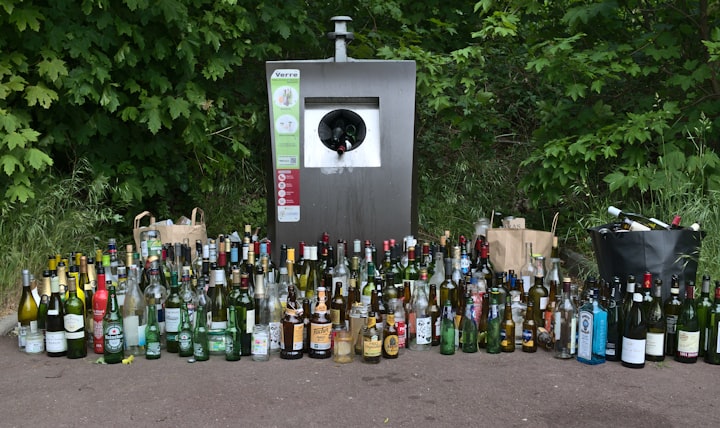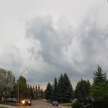Death of a Patriarch
A family sorts through the items left behind after an old man's death. Like archaeologists or anthropologists, they search for clues as to who the old man really was, trying to settle an life-long paradox. What kind of man was their patriarch?

I expected to have more warning before the death of any of my grandparents, although in hindsight I suppose their age should have tipped me off. I was in my late twenties before I lost my first grandparent, and few of my peers could say the same thing. Still, the call from my father surprised me.
Towards the end of the conversation my father said, "Do you have plans for the long weekend?"
Hoping that the death of his own father had turned my father's attention to his tenuous relationship with his own son, I said, "None."
"I could use a hand going through the old man's place," he said. "Figuring out what can be sold and taking the rest to the dump."
"Sure."
So after the funeral, which was the closest thing our family had to a reunion in the past decade, he and I drove out to the old man's place. Grandpa had bought this spot after my grandmother divorced him, but that happened before I was born. While my mother's parents had always been one unit, I had never once seen my father's parents in the same place at the same time.
"Dad... he wasn't a good guy," was the most my father ever told me, which made it even more surprising when my father brought us kids to see him and we discovered that he wasn't so bad. Over time I pieced together the story like a collage from other family member's comments. For most of my father's life, my grandfather had been an alcoholic. Then, two years after my grandmother divorced him, he sobered up. He had twelve good years, which started when I was about four. AA became his religion. He got married to a woman we all called Momma Jane. She never became our grandmother, but she was sweet enough, and everything was set for a happy ending. Then she died, Grandpa's old habits returned, and he'd spent the last decade as a recluse.
When we stepped inside the old man's house, my father sniffed the air. "It smells like him."
I inhaled deeply, but to me it was the smell of the shitty bar where me and my college friends used to get wasted. Grandpa always smelled like mint, courtesy of the packs of gum he chewed every day.
Sure enough, we found a bin full of empty beer cans under the sink. The house didn't have AC, so they'd had plenty of opportunity to grow fragrant. My father grimaced. I didn't know quite what to do. We were all aware that Grandpa had gone back to drinking, but seeing proof of it was different. When we tried an intervention, Grandpa saw it coming and dodged the ordeal. Dad had ended his relationship there: How can I help someone who doesn't want to be helped?
Looking down at the empties, Dad said, "Might as well bag these up and take them to a recycling depot."
"Right."
I didn't want to touch the cans. During Grandpa's twelve good years, we'd come here a few times every summer. My father always became cool and distant, and I realised later that even a decade of sobriety hadn't convinced my father to let his guard down. Either that, or he never became comfortable in Momma Jane's house. I learned to play poker from the old man, sipping root beers at the kitchen table. Grandpa always told the same jokes: oh my, that's a strong batch... And for years, I'd laughed because I was proud that I mostly understood the joke. In all of those trips, there hadn't been so much as a crunched beer can in the house. Yet here they were, desecrating the place.
"We should start with the attic," my father said. "It'll take the most time."
To access the attic we had to pass through my grandfather's bedroom and the bed upon which he'd died. A narrow staircase led us to the space which once had been a playroom, but had since been transformed into storage. It was filled with boxes and home-made shelves, and if it had ever been governed by an organisational plan those days were forgotten. Along with grungy puzzles and so many boxes there were the toys I'd played with as a child.
"Oh man," I said, grabbing a cap-gun from the floor. "Remember these?"
My father glanced at me, then shrugged.
"Grandpa used to buy us packs of caps whenever we came by. You remember those red rings? And we'd smash them with a rock to make all of the little cells explode at once?" There were few scents that caused a more visceral pleasure in me than the sharp smell of smoke from those detonated caps.
My father nodded slowly.
Grandpa had been more than a decent grandfather. He'd stocked the house with treats and toys whenever we came by. Momma Jane made brownies and tried to engage my father in conversation only to be rebuffed with monosyllabic responses.
Almost every box was labelled, except for the ones nearest the door which had clearly been the most recent additions to the collection. There were boxes of Reader's Digest magazines, boxes of lamps he'd bought at garage sales with plans to repair, boxes that he'd inherited from his siblings.
"Junk," my father said upon opening a box of mildewy books. He couldn't hide his glee when he said it, like this was a little victory over his deceased father.
"Can I look through those?" I asked.
My father shook the box, then repeated, "Junk." He carried it downstairs, undoubtedly loading it into the rapidly-filling trailer of goods destined for the dump.
That was when I found the box. It was tucked into a crawlspace, out of the way even by the standard of the attic. I thought I'd just found a ratty old quilt, but when I pulled it away, there was the package. Wrapped in brown paper and twine, it was the first package whose label made no immediate sense.
Private someone had written in bold letters, then underlined several times for good measure. I turned it over and found another message: Do Not Open. The paper was wrinkled, and while the twine secured the paper, it had been sealed without any tape. I pictured my grandfather tip-toeing between the boxes that had accumulated in his attack, kneeling on arthritic knees to enter the crawlspace. He would pull away the quilt with knobby fingers, untie the twine, and carefully unwrap... what?
My father's footsteps came from the stairs, and I scooted out of the crawlspace before he could see what I had found. I couldn't articulate why, but I knew that he couldn't see whatever that private package contained. For the rest of the afternoon, I tried to send him down to the main floor, but it never bought enough time for me to investigate on my own, and my pulse rose whenever he sifted through packages near the crawlspace.
That night he paid for a hotel room. We could have stayed at the house, but my father had never remained in that place overnight, and without saying so, I knew that he'd made up his mind not to change that pattern now. After we'd showered and eaten cheap pizza, my father turned out the lights. I expected to fall asleep straight away, but my father cleared his throat like we were ten year olds at a sleepover.
"I'm glad you loved him," my father said.
"I'll miss him," I responded. But of course, if I really would miss him that much, I could have made an effort to contact him after he fell off the wagon.
"It's easier to be a grandfather than a father."
Unable to see my father's expression in the dark, I didn't know what to say. "You were a good father."
"I know."
He didn't speak again, and before I fell asleep my mind returned to the box that had been marked Private. Just what secrets had my grandfather been keeping? Perhaps he'd joined the army, and no one had ever told me, and inside the package I would find a service weapon and a tray of medals. Or maybe there would be a journal detailing the early years of his life, providing some answer to why the bottle held such appeal for him. Or maybe I would pull the paper away just to find a collection of trinkets that would mean nothing to me but that had apparently meant everything to him.
In the morning, my father was getting out of the truck when I said, "How about you head on to the dump?"
He hesitated. "The house..."
"The trailer's getting full. I'll carry down the rest of the stuff from the attic so we can get two loads out today."
My father scratched at his chin, then said, "That's not a bad idea. Okay, I'll be back in a couple of hours."
Of course, I went straight to the attic's crawlspace. The private package was heavier than I anticipated since it was only about the size of a shoebox. I carried it down to the kitchen table. Even then I couldn't say why I needed to open this without my father. If I'd been gracious, maybe I would have followed the box's instructions and destroyed it without opening it, but I needed to see what was inside.
I wanted proof that my grandfather was the man I remembered, not the man my father remembered. I wanted something I could hold onto that carried more weight than a plastic cap-gun, something to counter-balance the empty beer cans and liquor bottles.
The twine came away easily. I removed the paper like my grandmother, who believed in saving wrapping-paper so that she could re-use it. It left me with a cardboard box, unmarked on all sides.
I lifted open the lid.
The box was full of documents and photographs. At the very top was a picture of my grandfather sitting next to Momma Jane in the hospital where she died. Underneath that was the last letter she ever wrote to him. It was sappy and romantic and beautiful and tragic: she thanked him for the happiest years of her life and for his constant presence.
Setting it aside, I went deeper. There were all the letters they'd exchanged, a practice they'd apparently kept up even when they lived under the same house. Pictures of them together on vacation.
The deeper I went, the further I went into the past.
A sick, horrible feeling washed over me: I was peeling my way through years, and the box was still so full.
You old rascal, one letter said. If you keep this up your wife is going to kick you out.
The photo attached to that letter showed a partially dressed, middle-aged Momma Jane in a sultry pose. I couldn't think of a justification for why she would have sent it to a married man.
There were still so many documents.
I wished that I had stopped. Those top letters were so pure and wholesome and innocent. If I had stopped there, I could have cherished them.
Someone knocked at the front door. My father stepped through, saying, "Have you seen my wallet? I think I must have..."
His gaze met mine and then dropped to the table.
I wished that I just had that final letter and the final letter alone. I could have shown it to him and said, See? This was the man who your father was. But I couldn't pick and choose, and he saw them all.
About the Creator
Littlewit Philips
Short stories, movie reviews, and media essays.
Terribly fond of things that go bump in the night.






Comments
There are no comments for this story
Be the first to respond and start the conversation.